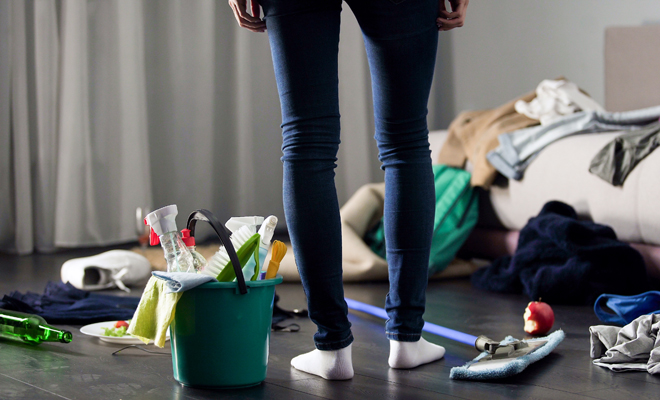Do you know someone obsessed with cleanliness and order? It may be that he is a clean and tidy person, something that does not seem like a negative characteristic, right? But it could also be that he has an anxiety disorder known as obsessive-compulsive house keeping disorder, which is to say, a real problem. We are talking about the famous OCD, which is one of the bitterest faces of anxiety.

What is obsessive compulsive cleaning and order disorder?
Obsessive-compulsive housekeeping disorder is an anxiety. Let’s go by parts. It is obsessive due to thoughts, which are true obsessions, recurring, intrusive and distorted thoughts. It is compulsive because of the behavioral reactions it causes, that is, compulsions, and repetitive actions in the manner of rituals.
And finally it is a disorder, since in addition to being one of the most dangerous manifestations of anxiety, it can become very limiting, affecting all areas of the life of the person who suffers from it. The obsessive compulsive disorder of cleanliness and order is not a rarity or an exaggerated attitude of a neat person; it is a problem that must be dealt with.
Obsessive thoughts in the case of cleanliness and order OCD refer especially to health, to the danger of catching a disease if something is not extremely clean, to the possibility that there are viruses and bacteria somewhere in the house. And the order. An order that acts as a preventive ritual so that everything takes its place, which is like pretending to have everything under control.
How cleanliness and order OCD manifests itself?
It is an obsession with cleanliness. There is not a speck of dust at home, everything is cleaned on the clean, every day is cleaning day at home and every last corner is reviewed so that there is no possibility of germs anywhere. The mere idea that something might be dirty triggers all the anxiety symptoms we know so well.
It is also an obsession with order. As important, interesting and useful as it is to maintain a certain order in spaces for personal well-being, in this case it is an obsession. And out of a compulsion. It cannot be helped. Cabinets that Marie Kondo herself would admire, the cushions perfectly arranged on the sofa, the household items strictly placed.
And that nothing is out of place because then the worst of misfortunes could happen. At least that’s what the person who suffers from this OCD of cleanliness and order thinks. It is not a personal decision; it is not a characteristic of his clean and tidy personality, but a need resulting from an anxiety problem.
How to recognize a person with cleanliness and order OCD?
The difficulty is in distinguishing a clean and orderly person from a person who is suffering from obsessive-compulsive disorder. What’s so dysfunctional about cleaning every day? What problem is there in keeping the closet ordered by colors or textures? What harm can it do to keep everything in its place, in the correct order or established according to that person? Well, sometimes it’s a big problem and sometimes it can do a lot of damage.
A person with an obsessive-compulsive cleaning and order disorder is detected at first in their home. If she has a family or if she lives with a partner, the people around her will live in constant tension to satisfy the needs of that person with OCD who, as soon as he sees something out of place, suffers from overwhelming anxiety.
Let’s not forget that it is not a hobby or rarity, it is a disease. And at work? Her desk will be organized to the millimeter and she will panic when someone moves a piece of paper or a pen at her, when someone touches her cup of coffee or puts a finger on her computer screen.
Characteristics of this type of obsessive-compulsive disorder
Anxiety is the key to understanding obsessive-compulsive disorders a little better. In the case of cleanliness and order, an excessive danger is imagined in the event that things are not clean or in their place. It happens as with phobias, that fears are triggered by the most surprising stimuli. But there is still more.
People with a cleanliness and order OCD are perfectionists, obviously with an excess of perfectionism that sooner or later begins to take its toll. Demanding people with themselves and with others who have generally been loaded with more responsibilities than they can really assume.
It is common for a person with obsessive-compulsive cleaning and order disorder to be a person subjected toe, who gives great credibility to their own thoughts and therefore does not realize how distorted they are. Those who suffer from this type of OCD do not usually handle uncertainty well.
The need to control, to have everything under control, to control everything, from thoughts and emotions to supposed threats, can lead a person to suffer from a major anxiety disorder. And from there to obsessive-compulsive disorder there is only a fine line that is not difficult to cross.
How to treat cleanliness OCD?
The implications of this obsessive-compulsive disorder of cleanliness and order can be perfectly understood. And you can also understand the problems that it can cause in the daily life of the person who suffers from it and the deterioration of their family, social and work relationships. Without forgetting the wear and tear that anxiety produces on one’s own personality.
Therefore, it is important to seek psychological help to overcome this obsessive-compulsive disorder of cleanliness and order. Support with pharmacological treatment is not ruled out in some cases, but the most common is to resort to cognitive. This therapy works on both obsessive thinking and compulsive behavior, so its results are very positive.
Any other supportive therapy is welcome to treat OCD. Generally, it involves gradual exposure, suggesting that the patient hold back for a few minutes before a speck of dust. It is just an example that should not be done on your own, since follow-up by a professional is necessary.
And since we are facing another anxiety disorder, among the strategies to follow to overcome OCD is the practice of relaxation, breathing exercises and meditation. It takes a while, we have to warn you. An obsessive-compulsive disorder is not overcome overnight, but with the necessary help, improvement is seen very quickly.
What did you think of this article? Remember that at Dario Feminine we are always willing to help you overcome any type of disorder that affects your daily life. Do not be overcome by the OCD of cleaning and order!






